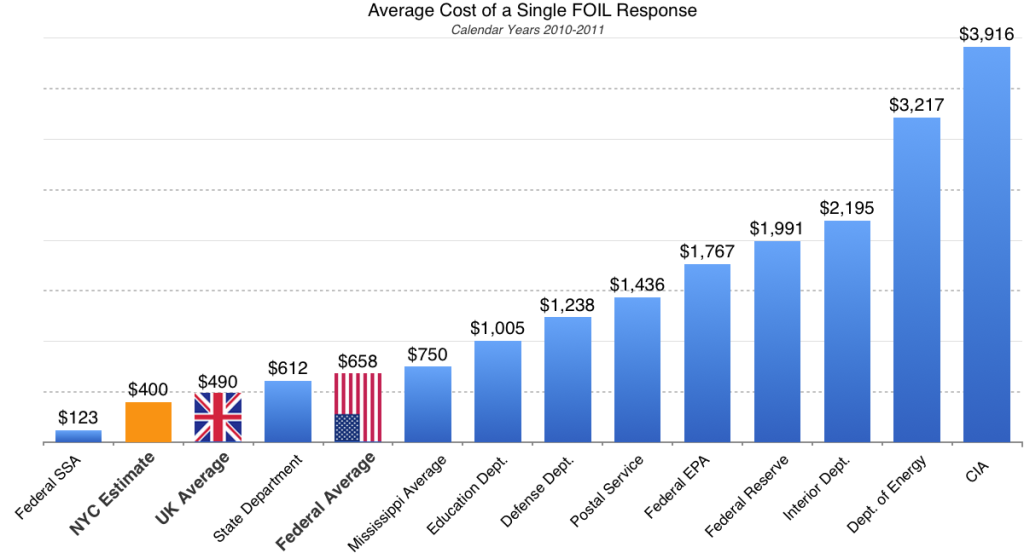Beyond Magic Markers: NYC Spends $400 Per FOIL Request
This is the second in a series of posts describing the transparency, accountability, and financial benefits of an Open FOIL system for New York City. Our full report is titled Beyond Magic Markers, and is available here.

Based on the detailed cost tracking done by the U.S. and U.K. governments, as well as a handful of U.S. cities, we estimate that New York City spends at least $400 per FOIL request – probably much more. The City does not track the cost of processing FOIL requests, or even how many requests it receives.
Unlike Federal government or the United Kingdom’s government, few – if any – New York City agencies use even basic FOIL processing software that would make it easier to determine FOIL costs. Based on the range of costs on the chart below, we believe our estimate is conservative, and the real cost per FOIL is likely much higher.
Both the U.S. and U.K. governments use advanced FOIL processing software which has been shown to significantly reduce the time and cost it takes agencies to record, track, and respond to FOIL requests.
New York City agencies do not use automated FOIL processing. Instead, they use a hodgepodge of paper-based methods that are expensive, slow and unreliable. Instead of online redaction tools, city workers use magic markers to blacken out names, social security numbers and other private information.
FOIL Cost Data
The average FOIL request in Yakima, Washington costs over $1,200. The US Department of Defense reports an average of $1,230 per request, and dozens of federal agencies spend thousands of dollars per request. Across all federal agencies, the average cost of a request is $658. In the United Kingdom, it’s roughly $490 per request.
Therefore, we conservatively estimate the 50,000 annual FOIL requests in NYC cost the city $20 million per year, at an average of $400 for each request.
To calculate the cost of the process of releasing documents under FOIL, we looked at federal agencies which measure the cost of a FOIL request from submission to record retrieval to response, and includes simple and complex FOIL requests and the cost of litigation. (The cost of litigation is just 6% of total FOIL costs is surprisingly small.)
The United States Environmental Protection Agency, during its feasibility analysis of its online FOIL system, stated that there are 94 departments and agencies which process over 600,000 requests each year.
The total spending at all federal agencies in Fiscal Year 2013, including the actual processing, information gathering, and response development to FOIL requests, was approximately $447 million for the 678,391 requests processed. Thus, we calculate that the federal government spends an average of $658 per FOIL request.
In comparison, the City of Yakima in Washington State reports that it spends $500,000 per year on FOIL requests, including staff, materials, and outside attorney time. Yakima received 400 FOIL requests in 2010, which means each FOIL request costs, on average, $1,250. There are a significant number of abusive requests filed in Yakima; one person has requested 65,000 pages of records, but this figure is not wildly out of proportion.
As another example, the US Department of Defense reports an average of $1,230 per request. Among all federal agencies, the DoD’s average cost per request is only the 38th-most expensive: the EPA ($1,700 per request) and the CIA ($3,916 per request) are significantly higher. Notably, for agencies which process more than 100 requests a year, the average cost per FOIL request is over $5,400.
These examples significantly exceed our federal average of $658 per request, which is itself relatively high. The United Kingdom, which has made significant investments in automated FOIL systems and open data initiatives to reduce FOIL costs, spends an average of $490 per FOIL request.
The experience everywhere is that governments which still use a paper FOIL response process — like NYC — have much higher costs. For example, the State of Mississippi estimates that every FOIL request answered by its transparency website, rather than by a FOIL request (i.e. a request which is avoided entirely), saves the state approximately $750 in staff time.
